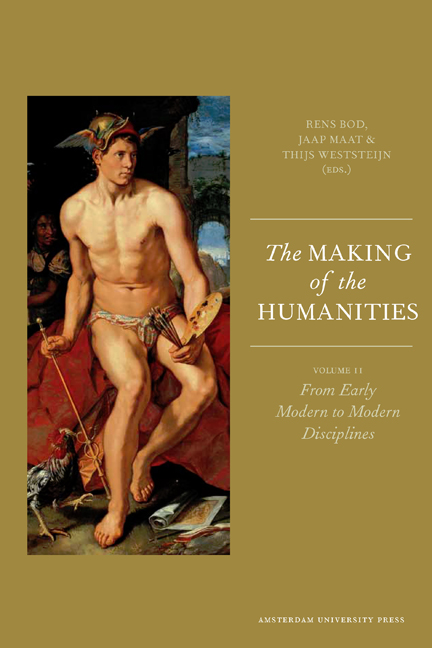Book contents
- Frontmatter
- Contents
- Introduction: The Dawn of the Modern Humanities
- I Linguistics and Philology
- II The Humanities and the Sciences
- III Writing History and Intellectual History
- IV The Impact of the East
- V Artworks and Texts
- VI Literature and Rhetoric
- VII Academic Communities
- Contributors
- List of Figures
- Index
Linguistics ‘ante litteram’: Compiling and Transmitting Views on the Diversity and Kinship of Languages before the Nineteenth Century
Published online by Cambridge University Press: 19 January 2021
- Frontmatter
- Contents
- Introduction: The Dawn of the Modern Humanities
- I Linguistics and Philology
- II The Humanities and the Sciences
- III Writing History and Intellectual History
- IV The Impact of the East
- V Artworks and Texts
- VI Literature and Rhetoric
- VII Academic Communities
- Contributors
- List of Figures
- Index
Summary
Introduction
The present contribution aims to address some issues relating to the transmission and the organization of linguistic knowledge in a time when there was no such thing as an independent linguistic discipline yet. Franz Bopp (1791-1867) is generally credited with having institutionalized a new academic branch of scholarship, since the publication of his Uber das Conjugationssystem in 1816 earned him the first chair of comparative linguistics at the University of Berlin five years later. Whereas the nineteenth-century interest in linguistics was chiefly limited to the study of the diachronic evolution and the genealogical kinship of languages (leaving aside some notable exceptions), twentieth-century linguistics mainly focused on general and synchronic linguistics. To a large extent, this major shift in perspective has been triggered by Ferdinand de Saussure's (1857-1913) Cours de linguistique générale, published posthumously exactly one hundred years after Bopp's Conjugationssystem (which may have been no coincidence). In the nineteenth century, however, research questions that were focused on the history and relatedness of (mainly Indo-European) languages took centre stage in the new academic discipline. Nevertheless, the interest in such historical and comparative issues was in itself far from new. From the early Renaissance onwards, a number of fundamental questions about human languages had been asked: why do different peoples speak different languages? What reasons underlie some striking commonalities between some of these different languages? Was there originally only one language and is this language still extant? Why do languages unremittingly change?
In close connection to the general theme of this collection of papers, which focuses on the development of learning and the different branches of scholarship, I will investigate to what extent these ‘linguistic’ views as developed by Renaissance and post-Renaissance authors have been transmitted and received, irrespec tive of their correctness judged by present-day linguistic criteria. The answer to this question is not obvious, as it should be singled out that issues concerning historical and comparative linguistics were usually treated in treatises that are not language-oriented in the first place. On the contrary, we see that problems related to the origin, diversity, change and similarity of languages are mostly dealt within very dissimilar contexts (such as historical works, theological treatises, and geographical descriptions), and that they are less widely discussed in grammars or books devoted to the construction of universal languages.
- Type
- Chapter
- Information
- The Making of the HumanitiesVolume II: From Early Modern to Modern Disciplines, pp. 37 - 54Publisher: Amsterdam University PressPrint publication year: 2012



